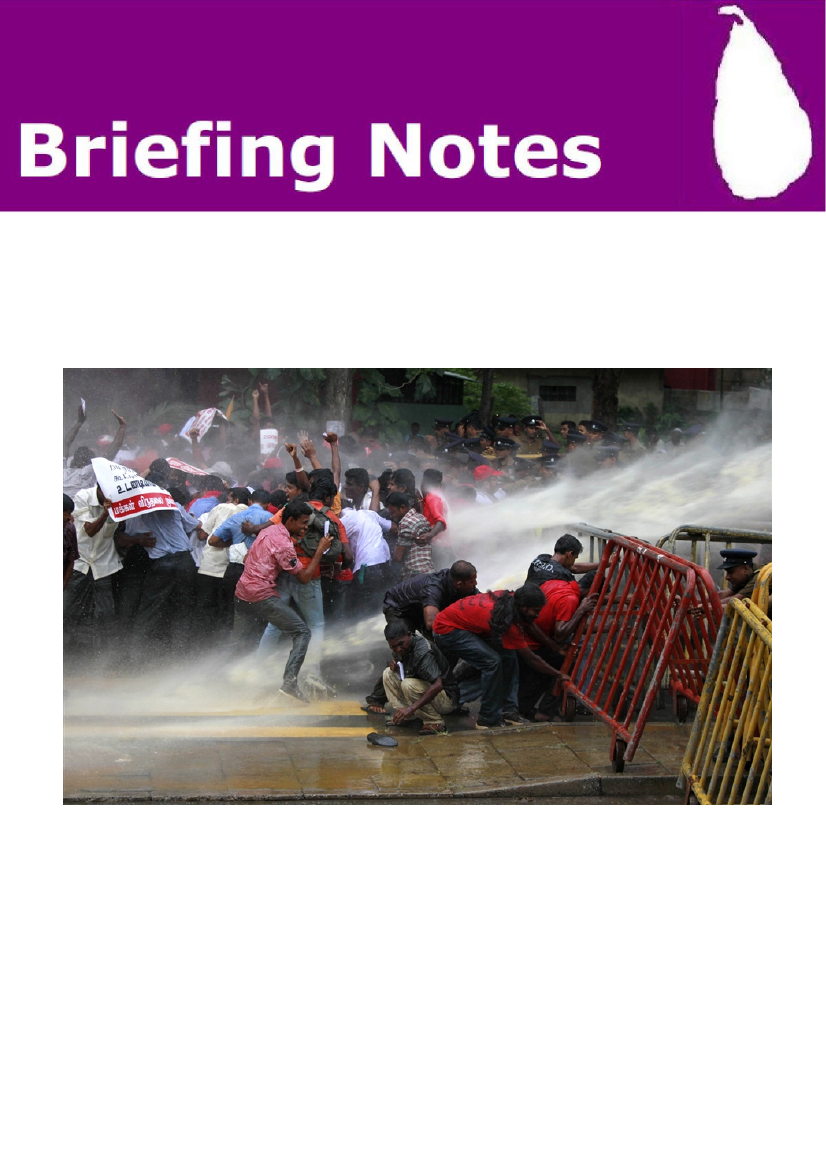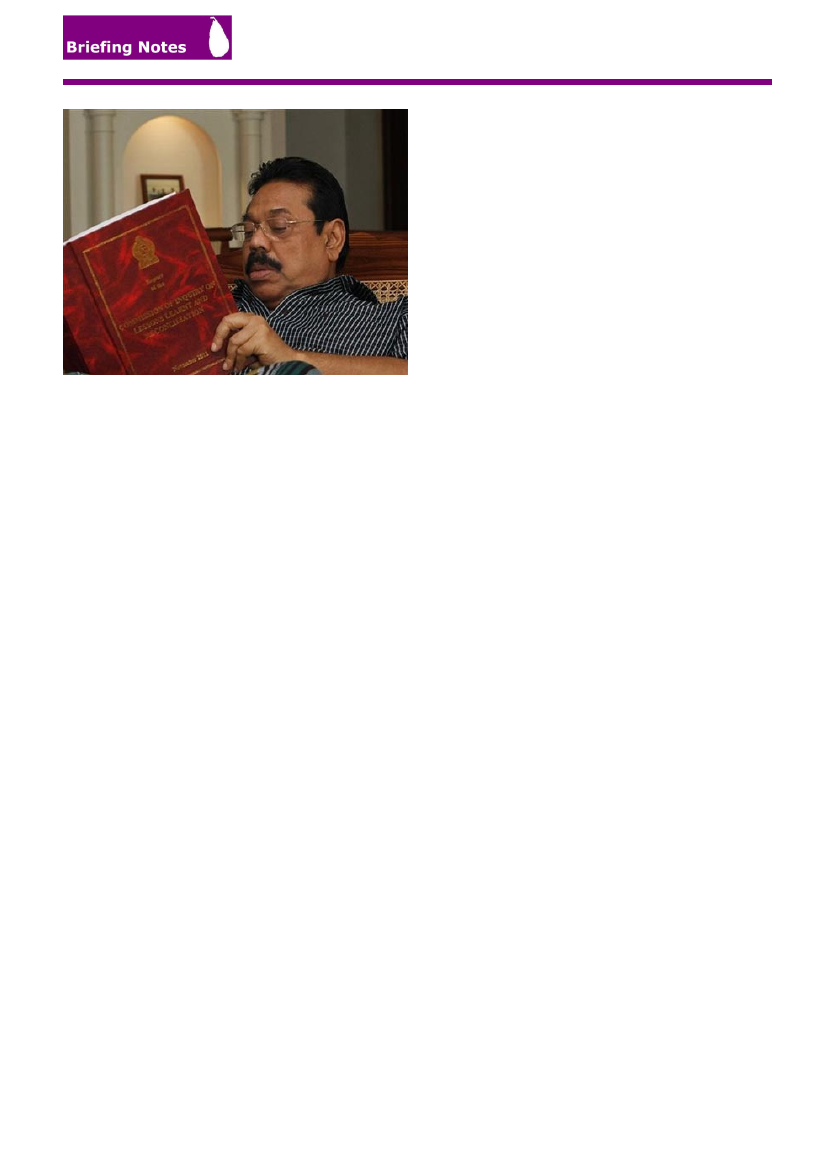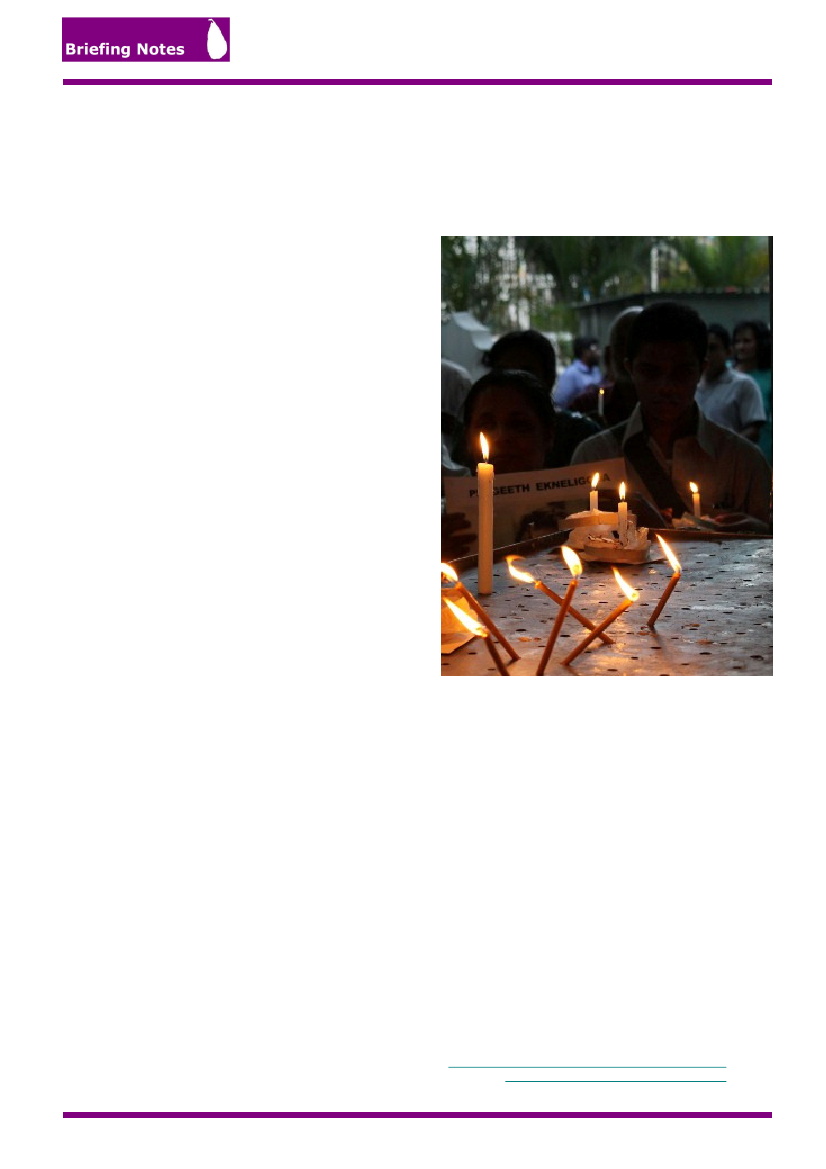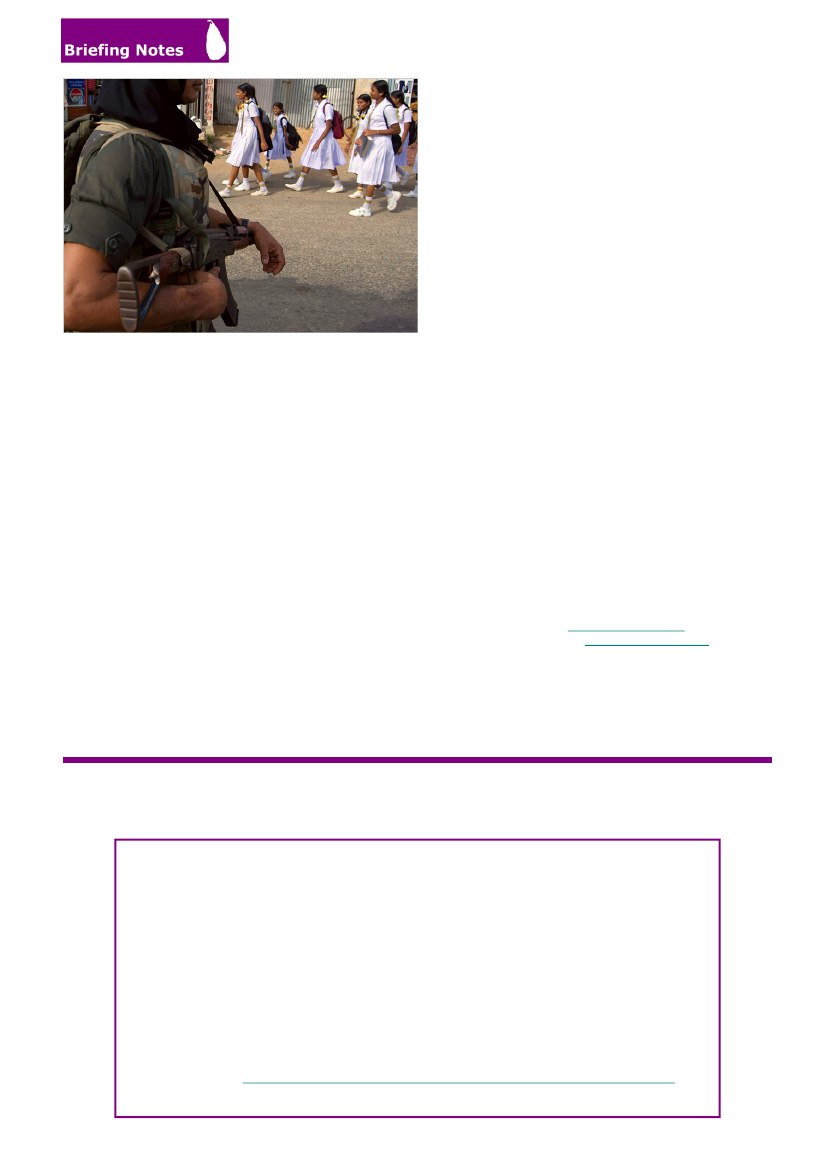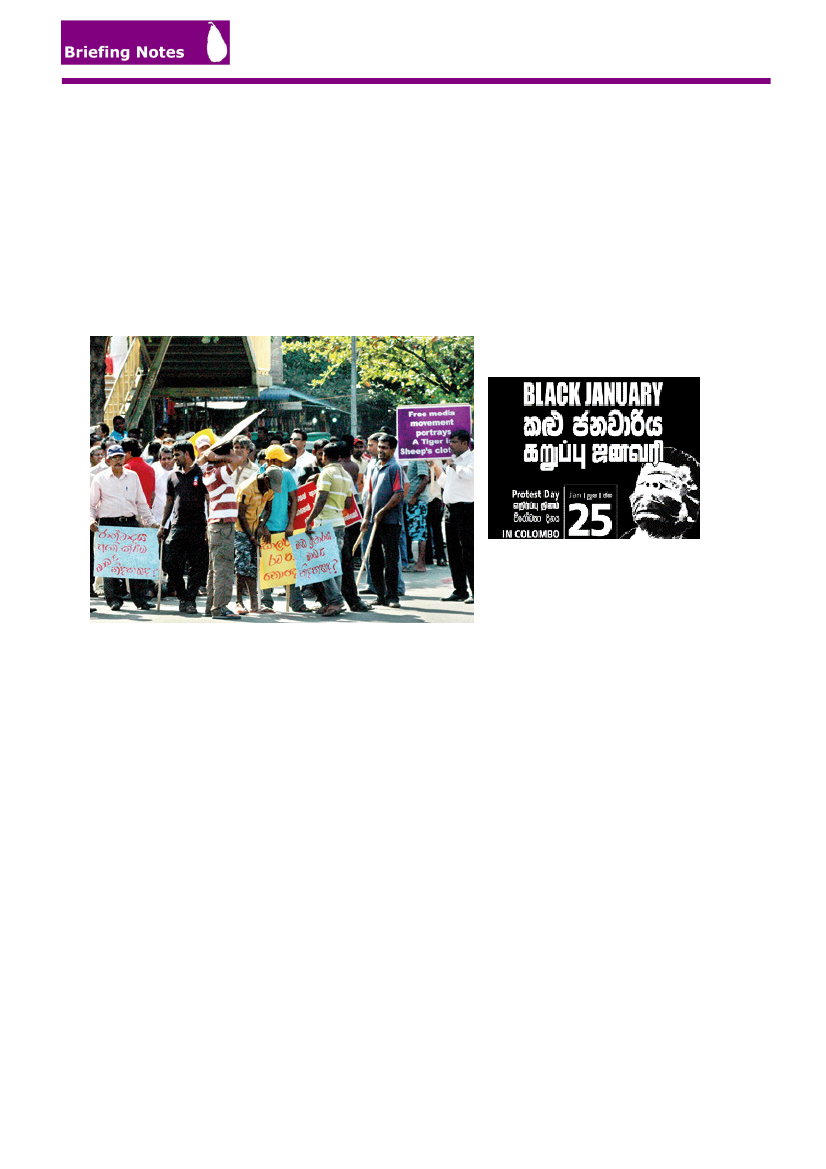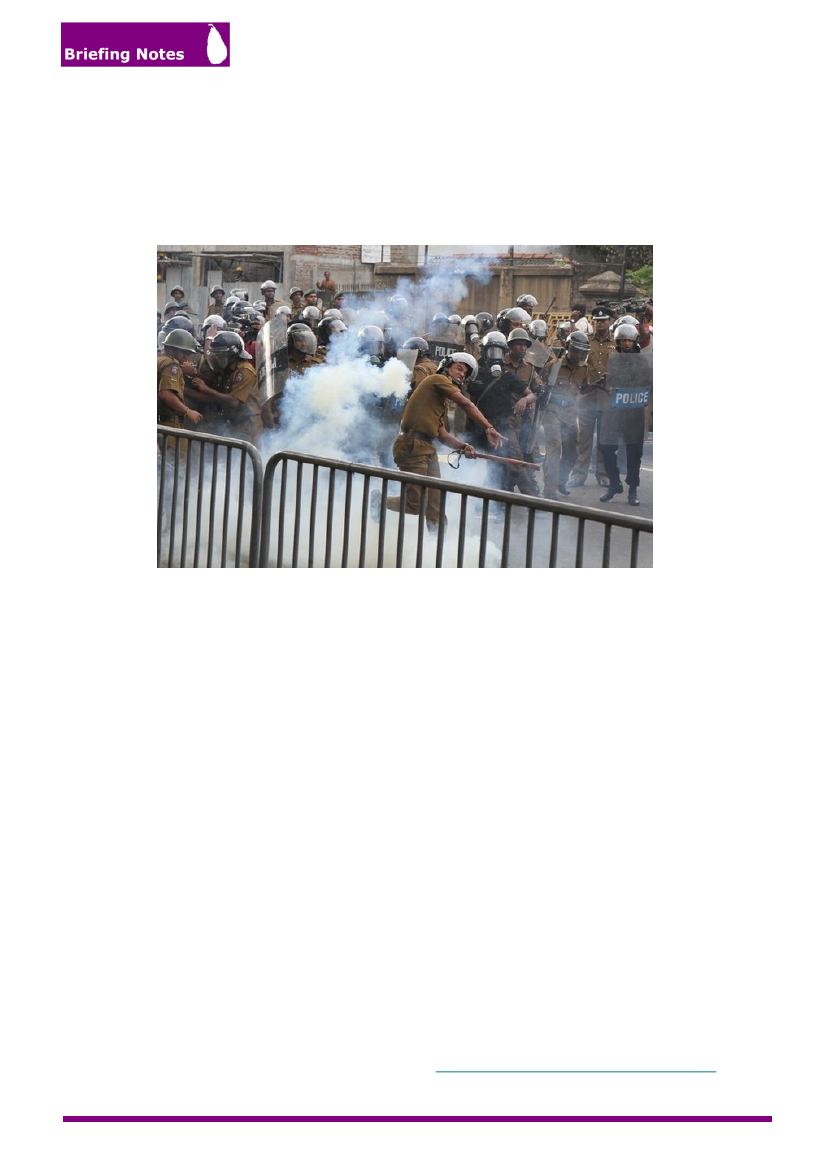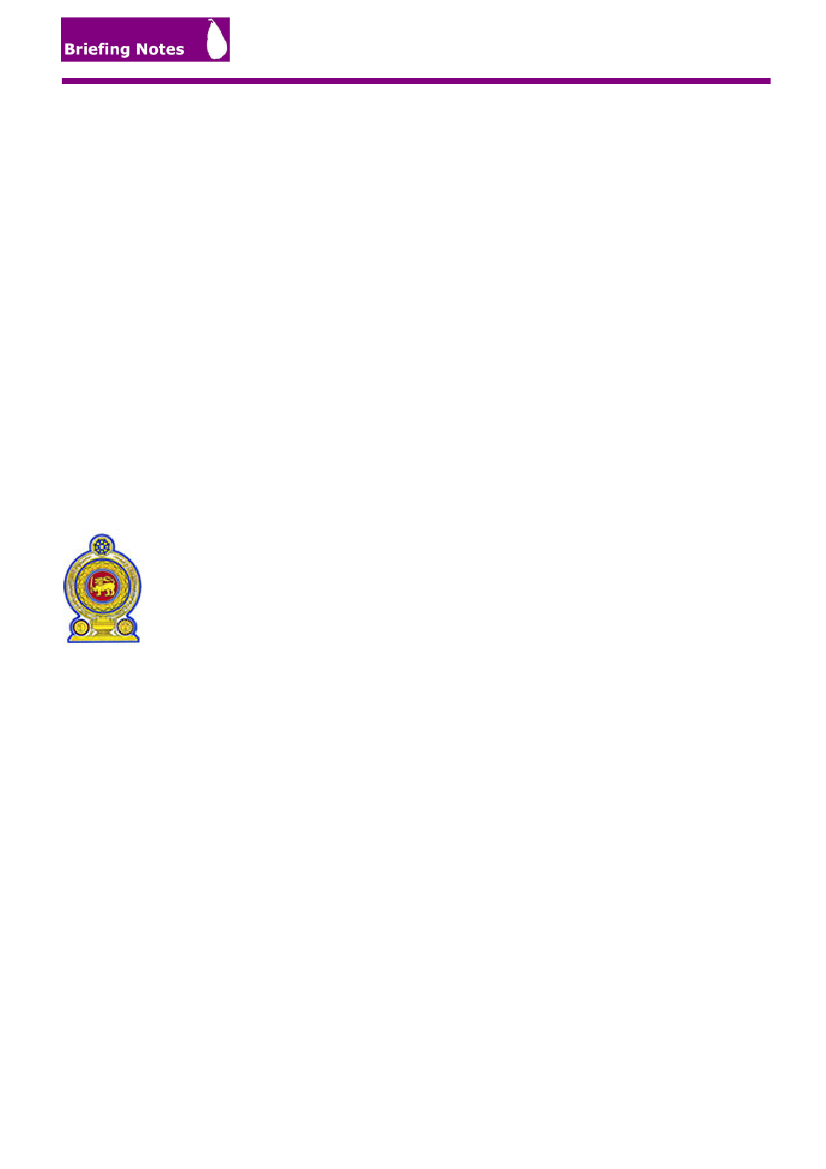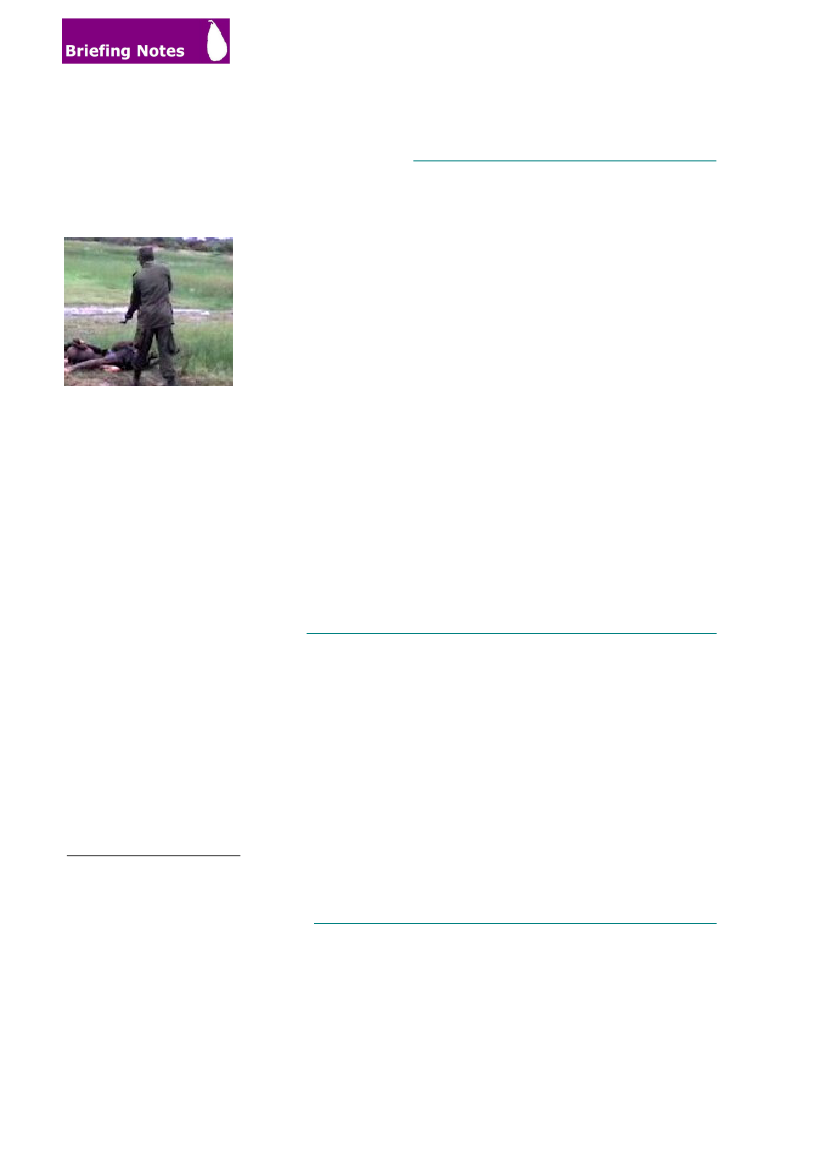Udenrigsudvalget 2011-12
URU Alm.del Bilag 166
Offentligt
Issue No. 02 – 2 March 201219thSession of the Human Rights Council, Geneva
15 February Colombo, Police use water cannons against protesters
POST-LLRC HUMAN RIGHTSVIOLATIONS IN SRI LANKALLRC – LESSONS LEARNT AND RECONCILIATION COMMISSION
2
CONTENTS
The Chronology
page 3
The Sri Lankan Lessons Learnt and Reconciliation Commission: A short commentary page 4New wave of abductions and dead bodies in Sri LankaAbductions since October 2011Key Findings on Accountability in Sri Lanka: January 20122012: Attacks on dissent in Sri Lanka: February 2012On the implementation of the LLRC recommendationsSome forgotten recommendations from the LLRC report… and pending country visits by Special Procedures Mandate HoldersEndnotespage 6page 7page 9page 11page 15page 18page 18page 19
Photo credit cover page: Eranga Jayawardena / AP
This dossier was produced with the support of the Sri Lanka Advocacy Network, Germanyand was compiled and edited by the Sri Lanka Brief team.For further information, mailto:[email protected]orseehttp://www.srilankabrief.org/
3
The Chronology19 May 2009:The three decade old war between the government of Sri Lanka and LiberationTigers of Tamil Eelam came to an end. LTTE was defeated and its armed struggle aimed at estab-lishing a separate country too came to an end,25 May 2009:Visiting UN secretary General and President of Sri Lanka singed a communiqué inColombo which stated that the''Sri Lanka reiterated its strongest commitment to the promotionand protection of human rights, in keeping with international human rights standards and SriLanka’s international obligations. The Secretary-General underlined the importance of an ac-countability process for addressing violations of international humanitarian and human rights law.The Government will take measures to address those grievances.''25 May 2009:European led resolution was presented to the UNHRC on the lines of the jointcommuniqué requesting independent international investigation in to the alleged human rightsviolation that has taken place in Sri Lanka. Resolution failed and Sri Lanka led resolution waspassed at the council there by blocking any independent investigation on the alleged crimesagainst humanity in Sri Lanka.15 May 2010:GOSL appointed the commission of the inquiry on Lessons Learned and Recon-ciliation (LLRC). The final report was presented to the parliament on 16th December 2011. Thereport cleared the GOSL and security forces of any war crimes but contains far reaching recom-mendation on reestablishing rule of law.22 June 2010:United Nations Secretary General appointed a panel of experts to advise him onhow to pursue accountability for reported war crimes and other human rights abuses committedby both the government forces and the opposition Tamil Tigers during Sri Lanka’s civil war. TheExpert committee report was made public in April 2010. According to the report the panel hasfound "credible allegations" against the Sri Lankan military/government and the Tamil Tigers forcommitting crimes against humanity.September 2011:The report of the UNSG expert panel was transmitted to the UNHRC. SriLanka opposed any interactive dialogue on the report recommendations and it only remains asreport posted on OHCHR website.11 Dec 2011:presenting the LLRC report to the parliament Minister Nimal Siripala said that ''Thegovernment seeks the support of all members of this House, rising above Party affiliation, tocarry forward the task of implementation with the energy that is called for at this crucial time.''LLRC recommendations on governance and rule of law were hailed as a harbinger of a new era bypolitical parties, civil society organizations and media.27 Feb 2012:USA mission in Geneva circulated a draft of proposed resolution requesting Gov-ernment of Sri Lanka to provide a road map to the 20thsession of UNHRC for the implementationof LLRC recommendations.
Odds with the reality''At another level, the government's claim that it will implement the recommenda-tions of the Lessons Learnt and Reconciliation Commission (LLRC)continues to be at odds with reality. ..However, the trend of events post the LLRCreport all speaks to the complete absence of sincerity on the part of the govern-ment in carrying out its frequently voiced reassurances that it will implement itsrecommendations.''Kishali Pinto Jayewardene,Lawyer, Human rights advocateand columnist ofSunday Times(Feb 2012)
4
The Sri Lankan Lessons Learnt andReconciliation CommissionA Short CommentaryFollowing the end of the war in Sri Lanka in May2009, a joint statement by the Government ofSri Lanka and the United Nations Secretary Gen-eral, committed to a process of accountability forviolations of international humanitarian and hu-man rights law and to take measures to addressthose grievances. The eventual outcome of thatcommitment was the “Lessons Learnt and Rec-onciliation Commission” (LLRC) appointed by thePresident of Sri Lanka one year later. Its finalreport was made public in December 2011.President Rajapaksha studying the LLRC report
1. The LLRC report highlighted some important findings and recommendations:•••••••••Identification of the root causes of the conflict;Recognition of joint responsibility by GoSL and LTTE for civilian causalities;Recognition that significant numbers of civilians were killed;Unacceptable control of the media and attacks on freedom of expression;De-militarisation of the Northern Province;The adoption of a non-participatory approach to the reconstruction and development of theformer war zones;The lack of implementation of recommendations made by earlier domestic investigationsinto disappearances and political killings.Recommendations for investigations into on-going human rights violations,Recommendations on land, governance and devolution of significant powers to the northand east.
For many observers the most notable outcome was the many thousands of witnesses, in particu-lar women, who came forward to provide their personal testimonies to the LLRC despite the obvi-ous risks to their security. This provides a clear message that many Sri Lankans, particular Tamilswho lived through the conflict, need truth and accountability to be able to move on and for anymeaningful reconciliation to take place.
2. The LLRC report fell far short of international standards:•The LLRC was appointed by the President without public consultation;•It was composed largely of former government officials, some of whom had been entrustedwith responsibility for defending the conduct of the war;•There was limited Tamil representation;•There was under-representation of women;•A lack of victim centred approach;•Lack of witness protection;•Witnesses subjected to hostile treatment by LLRC;•By contrast, the LLRC accepted with little critical questioning the reports of those witnessesrepresenting the government and the armed forces;•No sign the LLRC requested or received from the GOSL the full range of information andevidence in its possession: e.g., video of the warzone by unmanned drone vehicles, etc.•No sign the LLRC requested or received from UN and other international agencies the fullrange of information and evidence in its possession (e.g., UN data on civilian deaths, UNand other Satellite images…(Continued on page 5)
5
3. On accountability the LLRC report is deeply flawed:•There is no serious investigation of serious allegations;•All GoSL actions are presented as a necessary response to LTTE;•Food and medical shortages are put down to logistics problems when in fact there is evidencein the public domain of deliberate attempts to limit delivery of essential items to the north;•There is no review of the conditions in the camps;•Any misconduct by government agents is dismissed as accidental, with the possible exceptionof a few isolated incidents of individual misbehaviour.4. Credibility of the proposed actions:•There has been no progress towards accountability over three years, despite the systematicurging of the UN SG, senior UN officials, international governmental and diplomatic visitorsetc.•The LLRC interim recommendations made in September 2010 have not been implementeddespite the establishment of an Inter Agency Advisory Committee being mandated to take alead;•No mechanism is proposed to undertake an exhaustive independent domestic investigation todeal with accountability for war-time conduct;•For political reasons even the more minimal recommendations of the LLRC are unlikely to beheeded.•The is a long history of failed, ignored and/or politicised commissions of inquiry;•There is an established history of interference in commissions of inquiry by the Attorney Gen-eral’s Department (c.f. IIGEP experience);•The proposed Special Commission of Investigation of Disappearances does not cover killings;•The mandate, composition and performance of the National Human Rights Commission arenot considered adequate for it to assume responsibility for independent domestic monitoring;•All actions remain at the behest of the Executive in law and in practice;This is an abridged version of a document prepared by the IWG.Responsibility for editing is with SLB.
Very Unfortunate'It is unfortunate that the President failed to take the opportunity presented by Inde-pendence Day to show the nation and the international community that it had al-ready begun to implement the LLRC recommendations, and make a break with thepast. The LLRC itself thought fit to mention in its final report that its interim recom-mendations made about a year earlier had yet to be implemented''.Jehan Perera,Executive Director, National Peace Councilhttp://www.srilankabrief.org/2012/02/president-rajapaksa-failed-to-utilise.html
6
New wave of abductions and dead bodies in Sri LankaIn the past 5 months – October 2011 to February 2012 – there has been a disturbing risein the number of abductions, especially in and around the capital, Colombo. Out of 29 ab-ductions and 3 missing persons reported in media, most have not returned to their homesand families, rendering them ‘disappeared’ persons.The manner of these abductions has sent alarmbells ringing within the Sri Lankan human rightscommunity, recalling the twin phenomena ofthe ‘white van’ and the unidentified gunman’which plagued the country in the period from1987/1989, and which prompted two visits tothe island by the UN Working Group on En-forced and Involuntary Disappearances in 1991and 1992.Among those abducted have been social activ-ists, businessmen and those identified by thePolice as criminals and ‘underworld’ characters.Labeling abducted persons as belonging to theunderworld points to a disturbing new elementof ‘social cleansing’, which is being used to gar-ner public support for these killings and to di-vert attention from the fact that these abduc-tions are an expression of the collapse of therule of law in Sri Lanka.The abduction and killing of individuals from theso-called underworld can be in some way linkedto the public altercation between ruling partyMP Duminda Silva and Presidential Advisor andformer MP Bharatha Lakshman Premachandra,in which the latter was shot and killed.Amongst others who have been abducted arethose who have in any way challenged the au-thorities on issues of impunity and on-going hu-man rights violations. Lalith Kumar Weerarajand ‘Kugan’ Muruganandan, two political activ-ists, were abducted in Jaffna on December 9,while engaged in preparations for celebratingHuman Rights Day. On February 11, RamasamyPrabaharan, a Tamil businessman was abductedin Colombo, two days before a fundamentalrights case filed by him against the Police wasdue to be heard. Mr Prabaharan, who was re-leased from prison in September 2011 after twoyears in detention without any charges beingfiled against him, was challenging this arbitrarydetention and torture while in custody; he hadreceived threats asking him to withdraw thecase. On February 12, Chandrapala alias Mer-vyn, who had been brought to Colombo’s courtcomplex in Hulftsdorf for a bail application, wasabducted in the vicinity of the Courts while be-ing accompanied by Prison Guards. A full list of
Vigil for disappeared journalist Prageeth Eknaligoda
the 32 abductions which have been reported inmedia is attached.Most of the abductions have taken place inbroad daylight, in the capital, Colombo, and inits suburbs. 4 are from Gampaha district, closeto Colombo. All 3 missing cases and 3 of theabductions have taken place in the North, with5 in Jaffna. Of the 32 abducted and gone miss-ing. 7 bodies were found in public places; mostof them bore marks of execution. One body wasfound on the east coast following abductionfrom the Western province. 5 persons have re-turned home. In many cases the Police investi-gations are inconclusive and pending. Out of the32, one has been identified as a woman, twoare not clear and 29 have been identified asmen.by Watchdog (edited by SLB)http://www.srilankabrief.org/2012/02/new-wave-of-abductions-and-dead-bodies.html#more
7
Abductions since October 201127 February 2012 (based on media reports)27 Feb 2012:Kosala Ekanayake (29) ,son of the former UNP organizer for Mawathagama Ku-mari Ekanayake was taken way by several men had arrived at the home of in a black-coloureddolphin van , saying the police wanted to obtain a statement from him.14 Feb 2012:A 42 year old businessman allegedly belonging to an underworld gang was ab-ducted by group of armed men in a van from Dehiwala, suburb of Colombo.http://www.ceylontoday.lk/news-etail.php?news_id=2636&news_category_id=16
12 Feb 2012:Melhias Chandrapala aliasm Mervin, resident of Dutugamunu Mawatha, Piliyan-dala was abducted by a group of six men who had come in a white van while he had been es-corted by prison officers to the prison bus just out side outside High court premise Colombo. Themen had had automatic guns with them. The victim had come to the high court to sign bail pa-pers.http://www.ceylontoday.lk/e-paper.php11 Feb 2012:Ramasamy Prabakaran, businessmen who had filed a court case against tortureby Police was abducted by a group in a white van. There had been around seven men all armedwith pistols and shot guns in the van. Abduction too place at outside his residence in Wellawatte,Colombo.http://dbsjeyaraj.com/dbsj/archives/419902 Feb 2012:Sajith Sandaruwan (2d year Jayawardenapura University student) Abducted whilewalking to his lodgings from the University (Colombo district) After abducting, he was assaultedand dumped on the road and fled.http://www.lankatruth.com/english/index.php?option=com_content&view=article&id=1399:j-pura-student-abducted-by-white-van&catid=42:smartphones&Itemid=74
02 Feb 2012:Janaka Prabath (Kolonnawa Urban Council Chairman’s brother), Abducted near theMeethotamulla garbage dump in Wellampitiya (Colombo district).http://www.srilankamirror.com/english/the-news/10733-yet-another-white-van-abduction
02 Feb 2012:Muthusami Anandarasa, (suspected to be Jaffna district), went missing and founddead. Body was recovered by the Chunnagam police from a toilet pit on 4th Feb (in Jaffna dis-trict).http://www.lankasrinews.net/view.php?20VFMF20edgUO4ebdBs1cbdGdZYddc6172ac42tD4e43sXg2023ONS3208 Jan 2012:Panadura Donald alias Maligawatte Donald (male) Abducted in Moratuwa whiletraveling to Colombo from Panadura (Colombo district). One of Minister Mervyn Silva’s coordinat-ing secretaries. Later released and left the country.http://www.lankajournal.com/2012/01/mervyn%E2%80%99s-donald-abducted/
03 Jan 2012:Buddhika Dinesh.Resident of Ferguson road, Thotanlanga, abducted by a group ofmen in a white van. Body was found near the Kelaniya river on the 4th of Jan. shot in the headhttp://www.lankajournal.com/2012/01/man-abducted-by-white-van-found-dead-in-grand-pass/
02 Jan 2012:S Mohamed Nisthar, Owner of a centre rehabilitating drug addicts, Abducted whilehe was on his way to a filling station (Puttalam district) Later found dead, whit a shot in the head.http://www.srilankamirror.com/english/the-news/9971-another-white-van-abductee-found-dead
29 Dec 2011:Heenatiyana Madawala Indika Dinesh Chandrasiri Silva, (Govt member of Minu-wangoda Pradeshiya Sabha) was abducted in Kotadeniyawa, (Gampaha district), Dead bodyfound.http://www.srilankamirror.com/english/the-news/9843-ps-members-dead-body-found-under-a-bridge28 Dec 2011:Rajendran Muralitharan (Fish Trader) Abducted while he was driving his trishawat S B Fernando Mawatha, Modara (Colombo district); later dead body foundhttp://www.dailymirror.lk/news/15790-fish-trader-found-dead-after-being-abducted.html
(Continued on page 8)
825 Dec 2011:Thillainadarasa Kandasami, Between Mankulam (Mullativu district) and Colombo,Went missing while travelling to Colombo from Mankulan for business purposes.http://www.lankasrinews.com/view.php?20SAMA20eTlOK4eadBmecadB5YUddc4Y52ac4YmB3e42mOl2023QMK32
13 Dec 2011:Amal Rodrigo (close associate of Minister Mervyn Silva) abducted by 10 men in awhite van near a restaurant in Pita Kotte, (Colombo district).http://slnews.lk/index.php/component/content/article/1415
09 Dec 2011:Lalith Kumar Weeraraja (Human rights defender) abducted near the Atthiyar Gov-ernment school and an abandoned glass factory – Nirveli, Jaffna district);Kugan Muruganandan-(Human right defender) Also abducted along with Lalith Kumar.http://groundviews.org/2011/12/19/disappearance-of-human-rights-defenders-political-activists-lalith-kumar-weeraraj-and-kugan-murugan-on-9th-december-2011/
08 Dec 2011:Thalavathugoda Sudda (believed to be underworld leader) abducted by a group ofmen in a car near Athurugiriya area (Colombo district).http://www.srilankamirror.com/english/the-news/9290-underworld-operative-kidnapped
05 Dec 2011:Christopher Fernando (businessman) and uncle of a Govt member of the ColomboMunicipal Council abducted near Jampetta Street Kotahena (Colombo district) he was abductedby 5 men carrying T 56 weapon.http://www.thesundayleader.lk/2012/01/22/defence-ministry-probing-kotahena-abduction/
30 Nov 2011:Mohamed Jaleel Mohamed Feroze alias Feroze, reported as a drug trafficker and amurderer & closest ally of slain underworld leader Olcott. Abducted in Nugambo, (Gampaha dis-trict) while he was returning home along with some of his friends.http://www.srilankamirror.com/english/index.php?option=com_content&view=article&id=9105:negombo-underworld-leader-feroz-kidnapped&catid=1:latest-news&Itemid=50
12 Nov 2011:Dematagoda Aja, an underworld gangster, drug trafficker who had a pending courtcase was abducted by armed men in a white van near Dematagoda Junction (Colombo district).http://www.srilankamirror.com/english/the-news/8698-fate-unknown-of-abducted-underworld-gangster
11 Nov 2011:Kapila Bandara abducted while returning home after closing his bookshop in Nuge-goda. Released on the 13th after telling him that he was the wrong person.http://www.thesundayleader.lk/2011/11/20/criminals-posing-as-the-cid/
10 Nov 2011:Gayantha Perera abducted while he was at his girlfriend’s place in Gonawala havingreceived a call form a person woking in the state intelligence asking him to come to the junction.(Gampaha district) And when he went, was pushed into a white van.http://www.thesundayleader.lk/2011/11/20/criminals-posing-as-the-cid/
03 Nov 2011:Ruwan Chandimal Depp alias Navy Ruwan, abducted at Warakapola, Uduvana El-mandeniya area (Kegalle district).http://adaderana.lk/news.php?nid=1600221 Nov 2011:Unknown (Fish salesman from Orugodawatta), was abducted by 4 persons dis-guised in Army uniforms travelling in a white van. Returned home around on 22nd Nov.http://sundaytimes.lk/111127/News/nws_06.html
27 Oct 2011:Mr. Mohamed Niyazalias LokuSeeya, At a lonely place at Kerawalapitiya. (Gampahadistrict) Grabbed by four men in a white van while returning home from his devale . Body found 10days later on a beach head at Akkaraipattu.http://sundaytimes.lk/111211/News/nws_11.html22 Oct 2011:Mr. G K Dhammika Pradeep alias Karate Dhammika, Abducted by an unidentifiedgroup in a white van at Walpola in Rambukkana, while he was in hiding at a friend’s (Kegalle dis-trict).http://sundaytimes.lk/111211/News/nws_11.html17 Oct 2011:Mr. Priyantha Galaboda (Suspect of the killing of former MP Baratha LakshmanPremachandra), Abducted by a group of unidentified men who had come in a white van at at Kadu-wela (Colombo district).http://sundaytimes.lk/111211/News/nws_11.html
9
Key Findings on Accountability in Sri LankaJanuary 2012Eight students from the University of Virginia School of Law* visitedSri Lanka from January 1 to January 16, 2012 as part of the CowanFellows Human Rights Study Project, an independent student or-ganization.They conducted interviews in Colombo, Kandy, and the Vanniregion with Government officials, activists, NGOs, journalists, IDPs, ex-detainees and other individuals about the current status of human rights inSri Lanka. Based on those interviews and their own experiences in the coun-try, the students have compiled the following findings, which reflect thedearth of effective accountability mechanisms in Sri Lanka for human rightsviolations committed both during and after the war.
1. We were told that people who testified beforeThe media focuses on current events andthe LLRC were harassed by the Governmentavoids references to the war.afterwards. Many Government officials withwhom we spoke emphasized the need for Sri 6. Interviewees suggested that because of me-Lanka to focus on the future and to put thedia self-censorship, Government propaganda,war behind it.and a desire to focus on the future ratherthan the past, people living in the South are2. The LLRC report appears not to have beenunaware of the full extent of human rightswidely disseminated in the North. Manyviolations that occurred during the war andTamils with whom we spoke had not heard ofthe current conditions in the North.the LLRC or its report and never had the op-portunity to submit information or testify be- 7. Interviews with ex-LTTE cadres, includingfore the LLRC. The lack of awareness aboutpeople who were forcibly conscripted, indi-the LLRC in the North limits the effectivenesscate that individuals who were sent to reha-of the LLRC report in fostering reconciliation.bilitation on account of association with theLTTE continue to be closely monitored and3. Most interviewees think the judiciary is highlyharassed by military officials, despite neverpoliticized and cannot be used to hold thehaving been charged with any crime. TheseGovernment accountable for wrongdoings“surrenderees,” classified by the governmentcommitted during or after the war. Many ac-as anyone who spent any amount of timetivists have stopped filing human rights caseswith the LTTE, lack political representationbecause the pro-Government outcome is pre-and would benefit from the protections thatdictable.international monitoring in Sri Lanka wouldbring. In particular, surrenderees currently4. Interviewees complained that Governmenthave no avenue to report arbitrary deten-investigations of human rights violations,tions or harassment by the military.such as disappearances, assassinations, andbeatings, are frequently superficial and non- 8. Many families still do not know the fate oftransparent. Many investigations have beenrelatives who went missing during or afterongoing for years and have not resulted in athe war. We spoke with several families whoprosecution. Activists and attorneys told ushad last seen their relative in military cus-that their requests for updates on the statustody, but the Government denies any knowl-of investigations are often rebuffed by theedge of them. The lack of public records con-Government, and that the Government re-cerning detainees enables these disappear-fuses to reveal its evidence and findings.ances, and families reported extreme delaysand lack of government cooperation when5. Nearly every journalist and editor interviewedthey attempted to inquire about a detainee.agreed that the media in Sri Lanka self-Families of the disappeared and society atcensors, leading to limited public discussionlarge would benefit from an independent in-of the war and accountability. Many said thatvestigation into the cases of missing persons,the media does not publish anything criticalparticularly those last seen in Governmentof President Rajapakse, his brothers, hiscustody.(Continued on page 10)sons, the Ministry of Defense, or the military.
10explain why they still cannot return to theirproperty. They have no avenues to lodgecomplaints challenging the delays and re-questing explanations. Many believe that theirland is being used by the military for privategain, and they cited reports of the construc-tion of hotels and shops on IDP lands. Othershave received reports that their homes havebeen looted during the military’s post-war oc-cupation.11. The North is heavily militarized, with manyarmed checkpoints where people are requiredto provide their name, travel destination andthe purpose of their visit. Interviewees saidthat the Army frequently breaks up meetingsand assemblies in the North. We experiencedthis ourselves. Plain clothes officers were pre-sent at a memorial service we attended com-memorating a human rights activist killed inthe early stages of the war, and they ques-tioned all of the speakers and organizers im-mediately after the memorial. The heavy mili-tarization in the North restricts citizens’ free-dom of association and speech, making it dif-ficult if not impossible to share informationand to gather to protest or otherwise expresstheir views to the Government.
Militarization of the country — Jaffna
9. Surrenderees currently in detention have beenrestricted in their access to counsel. Inter-views with surrenderees about the process ofsurrendering to the military indicate that veryfew were informed of their legal rights, includ-ing the right to challenge their detention. SriLankan attorneys told us that families and at-torneys are rarely notified of transfers withinthe prison system, causing many detainees tobecome “lost” for periods of time. Attorneysare not optimistic about the potential for suc-cessfully challenging arbitrary detention, asthey are concerned that the courts are biased.Courts are also required to defer to the Ex-ecutive branch on many decisions under thePrevention of Terrorism Act.10. We spoke with internally displaced people(IDPs) living in Government camps who werefrustrated by the Government’s failure to
For more information about these findings,please contactCalleigh McRaith([email protected]) andClare Boronow([email protected]).This is a slightly edited versionof the original report.
Politically Constipated WaitIn a way, what the LLRC seems to say is, leave the MoD out of politics andcivil life and provide an opportunity for the Tamil people to pick their livesfrom where the war concluded, by giving them enough elected power in theirprovinces through improved PCs. Can or will this regime ever have the politi-cal intellect to carry through the recommendations? . A wait for this regime toimplement these LLRC recommendations could be a politically constipatedwait.Kusal Perera,Political Analysthttp://www.srilankabrief.org/2011/12/llrc-recommendations-can-rajapaksa.html
11
2012: Attacks on dissent in Sri LankaFebruary 20122012 has seen a sustained campaign Sri Lankan against human rights defenders with a special fo-cus on any engagement with UN processes, including the 19thsession of the UN Human RightsCouncil beginning in February in Geneva.Press freedom activists and organizations, human rights defenders and political activists are beingaccused of helping the revival of the Liberation Tigers of Tamil Eelam (LTTE) and of being part of aconspiracy against the motherland by bringing the on-going violations of human rights in the coun-try to the attention of the international community.
Obstruction and threats in relation to “Black January” protest
Pro government supporters some armed with poles, having displaced the media activists from their'Black January' protest, demonstrating in front of the Fort Railway Station. (Photo Sunday Times)
In January, the Alliance of Media Organizations in Sri Lanka, which is a broad front of 6 independ-ent media organizations, organized a campaign titled “Black January”, to commemorate killings andabductions of journalists that have taken place in January over the years, and to call for mediafreedom, the freedom of expression and an end to impunity for attacks on press freedom. A dem-onstration was scheduled to take place on 25thJanuary at 2 p.m. in front of the main railway sta-tion in Colombo, which is a popular venue for public protest actions. Wide publicity was given forthis campaign. The Police tried to obstruct this by requesting a court order prohibiting the demon-stration. Amongst those who expressed concern about this is well known constitutional and humanrights lawyer Mr. J. C. Weliamuna, who referred to this as “unlawful restrain of lawful assembliesand meetings”.1After the court allowed the protest to go ahead with some restrictions, governmentsupporters organized a counter-protest, bringing protesters armed with poles and sticks whochanted slogans against the Free Media Movement (FMM), which took the lead in organizing thecampaign, and exiled press freedom activists2in particular. They occupied the space where the‘Black January’ demonstration was supposed to take place, violating conditions of the court order,while Police watched by. The “Black January” protest was shifted to another venue to avoid anyconfrontation.
Use of state media to threaten, intimidate and discredit press freedom activistsOn 10 Jan 2012,media reported the Government of accusing leaders of the FMM of carrying outa campaign against the GSP+ tariff concession granted to Sri Lanka by the EU by sending morethan 700 petitions, of using FMM funds for this and of gathering information with opposition politi-cians.3The FMM denied this and asserted that they campaigned for retaining GSP+ and had urgedthe Sri Lanka government to respect human rights obligations.4(Continued on page 12)
12Throughout January 2012,the state controlled Independent Television Network (ITN) repeatedlybroadcasted visuals of press freedom activists (living in Sri Lanka and in exile) participating in pro-test campaigns in Sri Lanka and events during the September 2011 UN Human Rights Council ses-sions.5Accusations were made that implied that these activists were LTTE supporters and paid byother LTTE supporters. The tone and contents of these broadcasts appeared to make indirect deaththreats.6Media Minister Keheliya Rambukwella has been engaged in a sustained campaign of false and un-substantiated accusations against press freedom activists and organizations, compelling SunandaDeshapriya, a well known press freedom activist now in exile to write an open letter to the Ministerinsisting that he was not a terrorist.7Referring to statements broadcast on the“Athulanthaya” (Inside Story) program on ITN, Mr. Deshapriya questioned whether the Ministerwas taking information that would not stand scrutiny in a court of law into the public arena to builda hate campaign against him in the minds of the people.On 26 Jan 2012,Minister Rambukwella was quoted as saying that that some journalists who fledoverseas are joining hands with NGOs and foreign media to tarnish the good image of the countryand also sacrifice local journalists in exchange for “dollars and personal benefits”; he threatenedthat journalists who are unfaithful to the country and tarnish the country’s good image will not beforgiven by the country.8On 27 Jan 2012,Minister Rambukwella was quoted as saying that “certain journalists in the coun-try are funded by the defeated LTTE and foreign Non-Governmental Organizations. The governmentdid not have the necessary legal provision to take action against them. These journalists are work-ing to tarnish the image of the country and I have a list of names of such journalists.”9On 26thJanuary, the newspaper reported the Minister saying “We have a list of journalists and those whohave been working against the state. But unfortunately there is no legal action we could takeagainst them.”10The same news report quoted the Minister saying “their (organizers of Black Janu-ary protest) actions have been suspect as to whose agendas they are trying to fulfill”.
False accusations and mud slinging at press freedom watchdogOn 03 Feb 2012,The state run Sinhalese daily “Dinamina” carried a news report accusing FMMand the main Tamil political party, the Tamil National Alliance (TNA)11of planning to discredit theGovernment by making allegations and reported that 6 members of the FMM and some members ofthe TNA had already gone to Geneva.12It reported that FMM members in Sri Lanka were collectinginformation to sling mud at the Government and that exiled journalists supportive of the LTTEwould present this information in Geneva. The news report went so far as to attack the wife of apress freedom activist.13On 07 Feb 2012,“Dinamina” carried a news item that reiterated the above allegations.14It didn’tcarry the FMM’s strong denial of the above news item nor did it carry the “Dinamina” response tothe challenge posed to prove accusations.15On the same day, “Dinamina” carried another news item accusing the FMM of sending photographsto an exhibition against the motherland organized by LTTE supporters in London that “misinterpreteven actions carried out by the security forces of our country with good intentions”.16On 08 Feb 2012,In its editorial, “Dinamina” accused several organizations of obstructing freedomand democracy and placing barriers on progress and unitary nature of the country and of having asfriends, organizations and individuals that support and encourage separatism and terrorism. It ac-cuses the FMM of having been on the side of the “Tigers” during the war and having worked to sup-port the LTTE and doing innumerable despicable things against the country. The concluding linethat “The people will recognize the fraudsters whose actions are driven by this hatred and on thatday Sunil Jayasekera and all the so-called media freedom groups will not have anything left to say”appears to be an open incitement for violent attacks against the FMM and it’s convener, Mr. SunilJayasekera.17
(Continued on page 13)
13On 11 Feb 2012,a news item in the “Dinamina” titled “information about the relationship betweenFMM and the LTTE is exposed” accused senior members of the FMM of having relationships with theLTTE and after the defeat of the LTTE, of still maintaining relationships with LTTE’s internationalnetwork and working to bring the government into disrepute.18
Accusations of preparing for armed struggle in order to suppress HR campaignsOn 13 Jan 2012,the “Island” English newspaper published a report portraying organizations cam-paigning on disappearances, arbitrary detention etc., linked with a faction of the Janatha VimukthiPeramuna (JVP) as working against the government, including at the UN Human Rights Council.19They were accused of “relentlessly campaigning against the government” and “pushing for a politi-cal front against the government which could accommodate those supportive of the LTTE’s eelamproject” and that “those engaged in the ongoing protests were planning to step up their campaignin the run-up to the UN Human Rights Council sessions in Geneva.”In a meeting at the University of Jaffna, the Minister for Higher Education, S. B. Dissanayake wasreported as accusing student groups of preparing to launch an armed struggle with youth who wereformerly affiliated with the LTTE.20On 11 Jan 2012,In the state run “Daily News” English newspaper, Minister of Health, MaithripalaSiripala accused a JVP faction of getting ready to launch another insurgency.21The “Daily News”also reported Higher Education Ministry Secretary Dr. Sunil Jayantha Navarathna accusing a JVPfaction of hampering the university system through strikes on advice of LTTE supporters, puttinginto practice LTTE’s hidden agenda and receiving LTTE funds in return for destroying and hamper-ing the university system and having connections with LTTE supporters.22
Attacks, threats and discrediting human rights defendersIn January,in his speech delivered at the induction ceremony of the Organisation of ProfessionalAssociations the Defence Secretary (and brother of President Mahinda Rajapakse) Gotabaya Raja-pakse was reported as saying “There are ex-LTTE cadre, pro-LTTE activists and LTTE sympathisersoperating in various guises. … Others claim to be rights activists … certain human rights organisa-tions also seem to have been co-opted by radical elements.26He was also quoted as saying “LTTEcadre, activists and sympathisers efforts to portray a bleak picture about Sri Lanka to discredit SriLanka’s progress are sometimes helped by individuals and groups within Sri Lanka”.On 17 Jan 2012,a large group of activists travelling to Jaffna in 12 buses, to protest against dis-appearances in the North were repeatedly harassed and intimidated by police and military and pre-vented from proceeding to Jaffna.23On 20 Jan 2012,the Daily News quoted President Mahinda Rajapakse as saying “Though we havecreated a peaceful atmosphere, there are certain elements, trying to ruin this peaceful situation”.24On 23 Jan 2012,the office of Viliuthu, an NGO working primarily in North East was broken into.25In early February,several people who met a visiting US government delegation while they werein the North of the country, as well as the priest who hosted the meeting, were questioned by thePolice and Military.On 09 Feb 2012,a human rights defender in Kandy was questioned by the Terrorist InvestigationDepartment (TID) and warned of further actions, after being accused of working to revive the LTTEin the hill country.On 11 Feb 2012,yet again the perils of seeking legal redress for torture and lack of victim protec-tion was amply demonstrated, when Mr. Ramasamy Prabaharan was abducted, after having re-ceived threats to withdraw a fundamental rights case he had filed against senior Police officers inrelation to severe torture suffered while in detention.27(Continued on page 14)
14On 16 Feb 2012,a businessman who filed an anti-corruption complaint against the police, andwho has faced threats and attacks since 2007, was abducted in a white van and severely beatenand threatened with death if he took any further action or mad any complaints against the police.Several media activists who were attacked in the State media and organized the black January pro-test were followed on several occasions in January/February
Attacks on protests
On 17 Feb 2012, a thousands strong opposition protest was disrupted andattacked by the police in Colombo.
On 10 Feb 2012,as the Movement for People’s Struggle (also known as People’s Struggle Move-ment) was conducting a leaflet campaign in Colombo, armed security personnel had warned themnot to engage in distribute anti-government activities and photographed them.28On 14 Feb 2012,Police had beaten the family members and others protesting the abduction of aman near the main court complex in Colombo29, prompting lawyers to launch a protest against theabduction and police beating.30On 15 Feb 2012,a fisherman was killed and several others injured as the Special Task Forcesfired at a protest against fuel price hike in Chilaw in the North Western Province.31The Police hadimposed restrictions on the funeral of the slain fisherman, obtaining a court order to prevent anyprotests at the funeral.32On 16 Feb 2012,in Maligawatte, a protest organized by an opposition party, The Janatha Vimuk-thi Peramuna (JVP) was also subjected to tear gas attack by Police, and several people including aparliamentarian were reported as injured.33On 17 Feb 2012,in Colombo, an opposition parliamentarian, several protesters and passers-bywere injured and affected by tear gas attack by Police on a protest organized by the main opposi-tion party, the United National Party.34On 17 Feb 2012,it was reported that “The security forces have started to uncover bombs, suicidekits and other explosives from various parts of the island soon after the opposition political partieshave decided to commence an island wide anti-government protest campaign.”35By WatchdogSource:http://transcurrents.com/news-views/archives/8602
15
On the implementation of the LLRC recommendationsOn DetentionLLRC Interim recommendation (Sep 2010)"b) A major concern raised before the Commission was the fact that many people did not know thewhereabouts of family members in detention as they were being shifted from camp to camp.Accordingly, the Commission recommends an independent unit being established e.g. Ministry ofJustice, to address the following issues-1. Publishing a list of names of those in detention;2. When a person is discharged a certificate be issued so that the same person is not taken in tocustody again, unless new evidence is discovered against him for being linked with the LTTE;3. To look in to the general issue of laws delays (To expedite prosecution or discharge detainees).”The critiqueIn fact, even the LLRC observed that its own interim recommendations which were issued in Sep-tember 2010, such as publishing a list of detainees and disarming paramilitary groups, have notbeen implemented. This consistent record of non-implementation by the government, and its re-fusal to take steps towards creating a social and political environment of positive peace and justiceremains the most serious problem for the Tamil people in Sri Lanka. (see TNA leader S. Samban-than's letter to Members of the UNHRC, Geneva)
On the National Police CommissionLLRC recommendation“(b) The Police Department is a civilian institution which is entrusted with the mainte-nance of Law and Order. Therefore, it is desirable that the Police Department be de-linked from the institutions dealing with the armed forces which are responsible for thesecurity of the State;(c) An independent permanent Police Commission is a pre-requisite to guarantee theeffective function of the Police and to generate public confidence.”(Paragraphs 9.214 and 9.215)
The critiqueA farcical Commission will make situation worseThe Government announced this week (19.02.12) that a National Police Commission has been ap-pointed. Let us be very clear on this. A farcical Commission unable to change the status quo in re-gard to the complete breakdown of law and order in the face of overpowering politicization of thepolice, will only make the situation worse.Under the 18th Amendment, there is no possibility of an independent Commission being allowed tofunction. …Sarcasm aside, what the LLRC recommended was firstly, a de-linking of the Departmentof the Police from the Ministry of Defence and secondly, an independent permanent Police Commis-sion. These two requirements cannot be satisfied by putting into place a Police Commission underthe 18th Amendment. The matter is as simple as that.The previous Police Commission, (which was unconstitutionally appointed with the disregarding ofthe 17th Amendment), could not do anything concrete to bring about discipline in the police forcesince even their meekest directive was countermanded by politicians. Ironically a key point focusedon by the LLRC that police officers should be punished for their failure to record complaints andtake action, was already contained in the Public Complaints Procedures that were gazetted duringthis period. These Procedures had been drafted by the first Police Commission constitutionally ap-pointed under the 17th Amendment by the then President with the assistance of independent law-yers and civil society. However, they were brought into law only years later. Even then, the Proce-dures failed to have any impact whatsoever on the practical functioning of the police.As the LLRC quite correctly observed, the Department of the Police is a civilian institution and can-not justifiably be linked to the military. This de-linking is essential. For that too, one does not need(Continued on page 16)
16a roadmap or a time frame. Immediate action can be taken. In the absence thereof, even the lastshred of credibility that clung to this Government's repeated protests that it will abide by the rec-ommendations of its own homegrown inquiry commission, is stripped away.ByKishaly Pinto JayewardeneExcerpts fromhttp://www.sundaytimes.lk/120219/Columns/focus.html
On the “Channel 4 Video”: Sri Lanka Killing FieldsLLRC recommendation“The “Channel 4 Video” which has generated much discussion and contro-versy was also considered by the Commission. The Channel 4 video airedby a British TV broadcaster containing scenes claimed to be from a conflictzone, images of alleged summary executions and alleged sexual vio-lence.Based on the available material and taking into account the aboveconsiderations, the Commission wishes to recommend that the Govern-ment initiate an independent investigation into this matter to establish thetruth or otherwise of the allegations arising from the video footage.”(Paragraphs 4.361/4.377)
The critiqueA military court was appointed by the Army Commander to conduct an inquiry into the authenticityof the Channel 4 videos that raised allegations of war crimes during the last weeks of the war in2009. This is in response to the LLRC recommendation thatan independent investigation into thismatter be held.“The members of the army court of inquiry were appointed by Lt. Gen. Jagath Jayasuriya, who wascommander of the security forces in the Vanni, the main battle zone of the conflict, during the lastfew years of the war. Jayasuriya was “actively engaged in the overall military planning and opera-tions in the Vanni,” according to the army’s official website. An inquiry appointed by the com-mander who oversaw and was a colleague of senior officers who might themselves have been im-plicated in serious abuses cannot possibly be expected to be an independent and impartial finder offacts, Human Rights Watch said.”http://www.hrw.org/news/2012/02/15/sri-lanka-army-inquiry-delaying-tactic
On the de-militarization of the NorthLLRC recommendation“It is important that the Northern Province reverts to civilian administration in matters relating tothe day-to-day life of the people, and in particular with regard to matters pertaining to economicactivities such as agriculture, fisheries land etc. The military presence must progressively recede tothe background to enable the people to return to normal civilian life and enjoy the benefits ofpeace.” (paragraph 8.211)GoSL responseThere is no militarizationAsked about the complaints that the army presence in the north was overwhelming — Tamils com-plained that they were present even during private family functions — he shot back, “We haveminimum army presence there. There are military cantonments even in Kashmir, in Tamil Nadu.http://www.srilankabrief.org/2012/02/gotabaya-denies-north-lanka-is.html
On the investigation of paramilitary leader, Iniya BharethiLLRC recommendation“There were allegations made that one Bhareti is alleged to have committed several offences of ab-duction, extortion, robbery etc. in the Eastern Province. This matter was brought to the notice ofthe relevant authorities by the Commission. The Commission regrets to note that no meaningfulaction has been taken against the alleged wrongdoer, although many representers have referred to(Continued on page 17)
17the participation of the said Bhareti in connection with the offences referred to above.”(paragraph8.187)GoSL responseIniya Bharethi remains as the coordinator for Ampara district of President Mahinda Rajapaksa andrecently given a state award by the President himself.
On the investigation of EPDPLLRC recommendation“e. Several representers complained about acts of extortion that were being committed by mem-bers of the Eelam Peoples’ Democratic Party. When the leader of the EPDP was questioned hestated that, “after the rains there is wetness.” The Commission regrets to note that this approachby the EPDP leader does not augur well in fostering respect for the Rule of Law. The Commission isof the view that since there are several complaints against the EPDP there should be a full investi-gation regarding these allegations. Absence of an investigation would create a sense of impu-nity.” (paragraph 8.187)GoSL responseEPDP leader Minister Devananda is a member of GoSL delegation to the 19th session of theUNHRC.
LLRC regrets non-implementation“In this regard the Commission reiterates the importance of giving full effect to all ofits Interim Recommendations concerning illegal armed groups.” (paragraph 8.189)“The Commission regrets that full effect has not yet been given to its Interim Recom-mendations. Delay in taking effective remedial action would only result in a breakdownof law and order and the consequent erosion of the Rule of Law and the confidence ofthe people in the reconciliation process.” (paragraph 8.190)
Social and Political Freedom of Tamil People is jeopardized - TNAThe state of human rights protection and human security in Sri Lankacontinues to cause great distress to us. The spate of killings and abduc-tions, even in the last few months; the intrusive presence of the militaryin governance, on the streets, in trade and business as well as in theday to day lives of citizens; the negation of effective civilian administra-tion in the North; the expropriation of private lands; the arbitrary utiliza-tion of state lands for sectarian purposes; and the erection of massivemilitary cantonments in areas where people should have been allowedto resettle; are all manifestations of how the social and political freedomof the Tamil people in the North and East of Sri Lanka is being severelyjeopardized. The worst affected victims of this intense militarization arewomen and children, where widows and orphans are rendered particu-larly vulnerable to systematic exploitation and violence. Former womenLTTE cadres and other vulnerable women are coerced into playing therole of comfort women. Furthermore, paramilitary groups acting in con-sort with the military are known to be involved in incidents of rape andabuse, as well as human trafficking and organized prostitution.R. Sampanthan,Leader, Tamil National AllianceLetter to members of the UNHRC council members, 27. 02.2012
18
Some forgotten recommendations from the LLRC report•The Commission was also reminded that de-•An alarming phenomenon that was brought tospite the lapse of two years since the endingof the conflict, the violence, suspicion andsense of discrimination are still prevalent insocial and political life. Delay in the imple-mentation of a clearly focused post conflictpeace building agenda may have contributedto this situation.the notice of the Commission was the highlevel of interference by politicians of the rulingparty with regard to appointments, transfersetc of public officials. This is the very antithe-sis of good governance.
•The political culture of the country has madethe general public powerless and helpless to apoint that they have become dependent onpoliticians to obtain many services and ameni-ties they are entitled to.
•The Commission takes the view that the rootcause of the ethnic conflict in Sri Lanka lies inthe failure of successive Governments to ad-dress the genuine grievances of the Tamilpeople.
•The politicians and the political elite exercisethe power of the State to the detriment ofothers. This has led to a high degree of cor-ruption undermining the rights of the citizens.This naturally has had an impact on minoritygrievances, which would ultimately affect theprocess of reconciliation.
•Along with an independent Judiciary and atransparent legal process a strict adherence tothe Rule of Law is asine qua nonfor peaceand stability which is of the essence. A de-mocracy must assure a fair system of govern-ance under the Rule of Law rather than therule of men.
•Therefore, the Commission recommends thatthe Government should establish an inde-pendent institution to address the grievancesof all citizens, in particular the minorities,arising from the abuse of power of public offi-cials and other individuals involved in the gov-ernance of the country. This mechanismshould be invested with a strong investigativearm in order to enable it to effectively dis-charge its functions.
•Respect for the rights and freedoms of thecitizens of a country is the very essence of theconcept of the Rule of Law. It was stated thatlack of good governance, and non-observanceof the Rule of Law coupled with a lack ofmeaningful devolution were causes for creat-ing tension between communities.
•Failure on the part of the law enforcement of-ficers to investigate offences and bring of-fenders to book, where the offences are com-mitted by persons with political connections.
•The Commission strongly recommends theestablishment of an Independent Public Ser-vice Commission without delay to ensure thatthere is no political interference in the publicservice and that recruitment and promotionsin the public service are in conformity with theequality provisions in the Constitution.
•Over a period of time there has been a weak-ening of public institutions vital to the func-tioning of democracy thereby eroding the sov-ereignty of the people.
and pending country visits by Special Procedures Mandate HoldersSR on Independence of Judges and Lawyers(requested)SR on torture(requested in 2005)IE on minority issues(requested in 2007 and 2009)WG on enforced or involuntary disappearances(requested in 2006, 2007 and 2008,reminders in 2009 and on 20 July 2011)SR on human rights defenders(requested in 2008)SR on freedom of expression(requested in 2009)
SR on enforced, summary or arbitrary executions(requested on 28 Aug 2009, re-minder on 15 Dec 2010)
SR on freedom of association and assembly(requested on 6 Sept 2011)
19
Endnotespages 11—14:For full analysis seehttp://groundviews.org/2012/02/12/judicial-intervention-to-control-lawful-rallies-subverting-democratic-rights/2Specific names mentioned includes Sunanda Deshapriya and Poddala Jayantha, two prominent press freedom activists, bothof whom are in exile due to treats and attacks3Seehttp://www.colombopage.com/archive_12/Jan11_1326226327CH.php4Seehttp://www.bbc.co.uk/sinhala/news/story/2012/01/120111_fmm.shtml5See for example “Vimasuma” program broadcasted on the ITN channel on 11th, 20thand 23rd hJan. 20126For example, the “Vimasuma” program of 11thJan. said '' Those who betrayed the motherland for gold and titles even killed intime of kings. Their decedents live on today'' and predicts that ''They do no good to this country, some day they will also faceno good.''7See Sunanda Deshapriya’s open letter to Minister Keheliya Rambukwella, available athttp://groundviews.org/2012/02/05/mr-minister-my-name-is-sunanda-deshapriya-i-am-not-a-terrorist/8See Dinmina, English newspaper athttp://www.dinamina.lk/2012/01/26/_art.asp?fn=p1201261and an English media reporton this athttp://www.srilankamirror.com/english/the-news/10544-journalists-in-exile-conspiring9See Ceylon Today, English newspaper, available athttp://www.ceylontoday.lk/archives-online-details-more.php?news_id=2030&news_category_id=16&cal_date=27&dateSelect=2012-01-0110Seehttp://www.ceylontoday.lk/news-detail.php?news_id=2001&news_category_id=1611TNA is a the leading Tamil political party, and have won comprehensive victories at both Parliamentary and LocalGovernment elections for Tamil dominated North and East provinces in 2010 and 201112See original news in Sinhalese athttp://www.dinamina.lk/2012/02/03/_art.asp?fn=u120203113From the description, it appeared to refer to the wife of the present convener of the Freed Media Movement, Mr. SunilJayasekera14See original news item in Sinhalese athttp://www.dinamina.lk/2012/02/07/_art.asp?fn=n1202079and English translation athttp://nfrsrilanka.wordpress.com/15See FMM response athttp://sunandadeshapriya.wordpress.com/2012/02/07/fmm-challenges-ancl-editor-dinamina/16See original news item in Sinhalese athttp://www.dinamina.lk/2012/02/07/_art.asp?fn=n1202074and English translation athttp://nfrsrilanka.wordpress.com/17See original news item in Sinhalese athttp://www.dinamina.lk/2012/02/08/_art.asp?fn=e120208and English translation athttp://nfrsrilanka.wordpress.com/18See original news item in Sinhalese athttp://www.dinamina.lk/2012/02/11/_art.asp?fn=u120211119Seehttp://www.island.lk/index.php?page_cat=article-details&page=article-details&code_title=4313120Seehttp://www.colombopage.com/archive_12/Jan11_1326295466JR.php21Seehttp://www.dailynews.lk/2012/01/11/news02.asp22Seehttp://www.dailynews.lk/2012/01/11/news04.asp23See eyewitness account athttp://transcurrents.com/news-views/archives/743024Seehttp://www.dailynews.lk/2012/01/20/news20.asp25Seehttp://nfrsrilanka.wordpress.com/2012/01/24/sri-lanka-viluthu-a-tamil-advocacy-institution-in-colombo-attacked-and-ransacked-nfr/26Seehttp://www.srilankabrief.org/2012/01/ex-ltte-cadres-pro-ltte-activists-and.html27For initial report seehttp://dbsjeyaraj.com/dbsj/archives/419928Seehttp://www.srilankamirror.com/english/the-news/10954-movement-for-peoples-struggle-awareness-programme-disrupted29Seehttp://www.srilankamirror.com/english/the-news/11070-police-beat-up-protestors-demanding-abducted-mervyn30Seehttp://ceylon-ananda.blogspot.com/2012/02/lawyers-protest-abduction-of-remand.html31Seehttp://dbsjeyaraj.com/dbsj/archives/4247andhttp://www.wsws.org/articles/2012/feb2012/sril-f16.shtmland also32Seehttp://www.ceylontoday.lk/news-detail.php?news_id=2712&news_category_id=1633Seehttp://www.ft.lk/2012/02/16/jvps-fuel-hike-protest-thwarted-with-tear-gas/34Seehttp://www.ft.lk/2012/02/18/unp-fumes-over-tear-gas-attack-on-protest/35Seehttp://www.srilankabrief.org/2012/02/bomb-scare-to-prevent-anti-government.html#more1
20
Complete indifference to GovernanceThe regime has failed to improve governance structures and, in fact,it has shown complete indifference to governance. If we have aquick look at its governance record, almost all the public institutionsincluding regulatory institutions and law enforcement agencies werepoliticized. The constitutional guarantees available for protectionagainst politicization were removed with the 18th Amendment to theConstitution. None of the assassinations of journalists and attackson media institutions were seriously investigated. All the cronies ofthe government and their families are above the law. It has nevertaken steps to eliminate impunity. In my view, these are well plannedstrategies of the regime - for a clear purpose of tightening the politi-cal hold. If the governance related recommendations are imple-mented, then the Rajapaksa regime will lose its political grip and afair political equilibrium will emerge. In my view, that is not a risk theregime will take.J.C. Weliamuna,Eisenhower Fellow, Senior Ashoka Fellow & Constitutional Lawyerhttp://www.srilankabrief.org/2012/02/can-gosl-implement-llrc-recommendations.html
